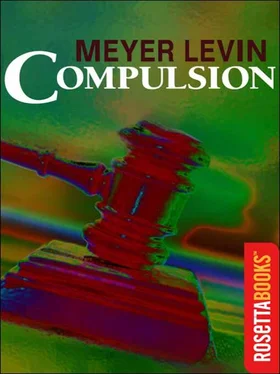As he talks, headlong, about pure love, abstract love, it is almost as though he were exorcising the moment when he will be caught by that same dreadful purpose, by the demands of real life, that make a bond between men and women. He is still free, and perhaps in the crime he has committed with Artie he has made himself free forever, for as the toils of natural love reach toward him, the toils, also, of the punishing law may be reaching to seize him.
And thus as Judd talks, his sense of inverse pleasure increases: it is as though a self-thrust knife were already in his flesh, to cut off this prospect of love, and as he twists and turns in his emotions the heightening tension of his muscles presses exquisitely against the ready blade.
This, too, in her innocence Ruth cannot know. And Judd hints only darkly; he says he does not believe happiness ever to be obtainable for himself. And when she spoofs, “Oh, Judd, you’re just having Weltschmerz ,” he pretends perhaps she is right, but lets her feel there may indeed be something more, something dark and personal.
“But what is it, Judd?” Ruth begs. “Why do you have these fits of melancholy?”
“Oh, the whole world,” he says. “It disgusts me. The things people do.”
“I know,” she says. “Sometimes you wonder how human beings can be so ugly, when they are capable of beauty, too.”
He plays with the idea of a sudden Dostoevskian confession. To tell her everything, the crime, and even how he intended to rape her. What would she do? Could he possibly discover in Ruth a soul so deep that it could encompass the horror of his own? Or would she jump out of the car? He feels she might burst into prolonged tears. That would finish everything.
But perhaps the black knowledge would draw her in, seal her to him, like the time, the breathless night, when Artie had let him guess about the body pushed into the lake. From that night, he had felt sealed to Artie; and the whole need to take part with Artie in another such crime was perhaps a need to put himself beyond the reach of ever squealing on Artie.
Could Ruth be up to it? In the remaining days, if only days remained, to treat all of life like some Huysmansesque Black Mass! Could she join him in a carnival of the senses?
“A penny,” she says.
And with a short laugh Judd reminds himself that Ruth is nevertheless a nice girl, that this is a component part of his permitting himself to be drawn to her, as an experiment. Perhaps a girl like Myra could go into some mad final carnival, but not Ruth. So he responds to her conventional query with, “Oh, just the same old subject.”
“Dat old debbil sex,” she quotes knowingly, soothingly. The sophisticated note returns to his voice and Judd makes some remark about Paris, soon – Paris, where they know how to make the most of such pleasures – and she mock-slaps his wrist, and he says well, of course, he believes in the same freedom for women as for men.
Ruth begins to say, “Would you like it if I-” but cuts it short, and Judd says, with a show of self-surprise, “You know I do believe I would feel quite furious; I would feel possessive about you,” and she laughs softly. “You see, all our smart theories-” And there is a lapse, and she remarks that she heard his brother is getting engaged.
Oh, he had meant to invite her – the party is Wednesday, Judd says. But is he sure it isn’t meant to be strictly a family party? Ruth asks. Perhaps she would be… “Oh, no!” he insists. “It’s a big brawl. The whole South Side will be there, and anyway even if it were a family party” – he feels suddenly peculiarly not himself to be saying a thing like this, yet tells himself he means it – “you must come!”
And the girl, his brother’s girl, Ruth asks, what is she like? Has he met her? Max met her in New York, Judd tells her; it was one of those conventional things, a perfect match, a Mannheimer. The girl is said to be very nice, quite pretty. She will arrive day after tomorrow for a visit, to meet Max’s friends, and from then on Judd is sure the house will be unbearable…
Suddenly he remarks that he has often thought of simply going away, leaving home on his own, bumming around, something like Harry Kemp tramping on life. She restrains herself from observing that all boys have such an impulse. And he continues, saying with a self-conscious little laugh, “Or maybe even getting married.”
“Now,” Ruth says, “ that is surprising.”
Yes, Judd says, he has thought how it would be to have a wife and a home, but with someone quite different from his own family.
Ruth says she understands how he may sometimes feel a stranger at home, because even in her own home – though her mother and father are angels, and her mother is very young in feeling, more like a girl friend – still, parents can’t really tell you everything; you have to find out for yourself.
Then Judd is speaking of his mother. An invalid for many years, she was ethereal, like a Botticelli madonna – and within himself he goes on to say that truly she was a madonna, a virgin, and she was like Ruth – from Ruth there is something of the same emanation of purity and goodness – and then he sees himself being held aloft by a virgin mother. Though he is an infant, he is a person fully developed, speaking and able to walk, and already complete in intelligence.
He hears himself telling Ruth deprecatingly how he was indeed a prodigy, speaking his first words at the age of four months. She laughs softly, saying it is difficult to imagine him as a baby, and he declares he never was a baby; he resents the idea of having been a helpless baby.
Ruth has become so tender toward him; now their talk drifts into silence, and they sit looking at the dark lake, and their faces turn with the same impulse, and there is a slow tender kiss, the lips touching without weight, simply as though they were of one being. A lovely melancholy fatedness rises in their hearts. And it seems to Judd that he has the power to make the whole deed with Artie turn non-existent. It seems to him that he must somehow have drawn back that deed, erased that entire night from the schedule of time.
In bed that night, Judd could not summon the image of Ruth. He could not summon the madonna image of his mother. He could not summon the image of Artie. Instead there was his brother in the dark blue uniform with the brass buttons, the uniform of the military academy. He remembered when Max came home the first time in that uniform, Max, so huge, so strong, and Judd just a shaver eyeing him from the hallways.
And he remembered, too, the morning he was still in bed and Max caught him doing it and said if he kept on, the thing would come off and he would be a girl. Then way, way back there was fat Trudy, his nursemaid, her huge mouth open, laughing, the irregular teeth, and suddenly her head swooping down, and his terror, her laughing sounds through it all, and her joking threat that he would be no more than a girl, and the torture, pleasure, torture, like tickling, and big Trudy making imitation devouring sounds… “I love my little boy, my little man!”
The following morning all this was absent; he awoke with only the strange tenderness in him. The sense of wanting to see Ruth persisted. And as he drove to school, a whole new drama was being enacted in his mind; the play continued during class. He might perform it tomorrow at Max’s engagement party. “I have an announcement to make!” Oh, that would be a good one on brother Max, the self-satisfied groom, the centre of attention, suddenly fading into the background while the startled gasping crowd listened to his kid brother. Judd had to stand on a chair for his head to rise above their shoulders, and he announced – was it his own engagement or the crime? As he sat through the lecture his fountain-pen was busy: again a hawk, the talons open, sharp, long, and ready to strike. Near it he made patterns of the sun, with streamers of energy flowing out. Now, spread-winged on a cross, a great bird, an albatross. But still he was following something the instructor was saying about compound crimes – sometimes in compound crimes the lesser crime took precedence! Suppose they traced the glasses. To him. Suppose they somehow traced the letter. His. And it was he who had rented the car. (The cleverness of Artie! Judd smiled inwardly in appreciation.) But if he were caught by these items, wasn’t he free to make his own deal? Premeditated murder was death. But if the kidnapping had been a prank, the death accidental, if he made a deal for a charge of manslaughter, there might be only a few years in jail. He saw himself a model prisoner, studying, reading. Ruth waiting, and coming to visit him, and waiting…
Читать дальше












